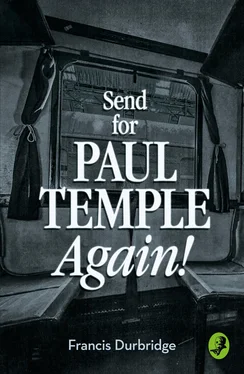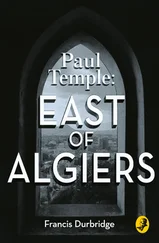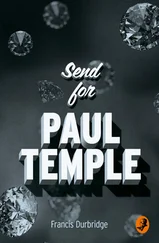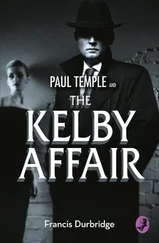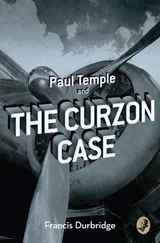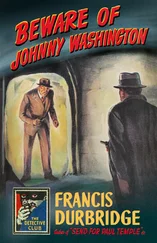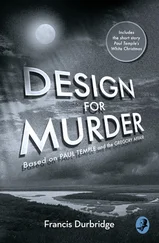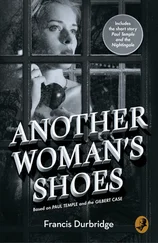She looked round cautiously as if she were scared of being overheard. Then she went on, ‘Please believe me, it’s desperately important.’
Temple said, ‘I’m sure it must be.’
‘We can’t talk here,’ she said nervously, looking at the row of doors, as if she expected any one of them to open suddenly.
‘Then what do you suggest?’
She placed a forefinger and thumb inside a belt she wore, and produced a slip of paper.
‘Could you possibly come to this address – tonight?’
Temple took the paper and glanced at it casually.
‘Tonight, at what time?’
She moistened her lips, hesitated, then said:
‘Half past ten. You will come, won’t you?’
‘Yes, all right.’
‘You promise?’ she insisted anxiously.
Temple eyed her keenly, noting the attractive high cheekbones and keen grey eyes set widely apart.
‘Yes, I promise,’ he slowly assured her.
Obviously relieved, she went to a door opposite where they stood and opened it. ‘This way, sir, please,’ she called, raising her voice.
The room into which she showed him was quite plainly furnished. There was, however, a very comfortable couch in an alcove farthest from the window, and there was also a large armchair beside it.
Doctor Kohima was sitting at a large desk in the middle of the room, and he rose to shake hands with Temple as he came in. The doctor was quite obviously an Egyptian. His skin was honey-coloured and he had a handsome profile that would most certainly find favour with a large feminine clientele. When he spoke he had a soft voice rather like the purr of a contented cat, a voice calculated to extract the most intimate confidences, however unwilling the patient.
Temple had already looked up his record and had discovered that he was fully qualified in medicine, but had devoted five years to psychological analysis under the celebrated Pulitzer in Vienna. He was, in fact, reputed to have been a favourite pupil of the great man.
At a first meeting, Kohima always gave the impression of holding a tremendous reserve of very vital mental power which it was difficult to describe. There was a warmth in his handclasp, and he nodded to Temple to take a chair.
‘I am so sorry to have kept you waiting, Mr. Temple,’ he apologised in a sincere voice with the merest trace of accent. ‘Do sit down, please. According to your ’phone message, you wish to consult me upon a purely personal matter.’
He swung round in his swivel chair and smiled frankly.
Temple could not restrain the feeling that here was a man with whom one could put the cards on the table. But this feeling was tinged with caution, for he was aware that the doctor must be an adept at breaking down defences, and knew every gambit to suit all types of individuals.
‘To be quite frank, Doctor Kohima,’ he began carefully, ‘I should simply like to ask you a few questions.’
A tiny frown puckered the loose skin round the doctor’s dark eyes.
‘This is not a newspaper interview?’ he asked, still in the same pleasing tone, though Temple noticed that his expression had changed.
‘No,’ he said. ‘Nothing like that.’
‘Then I shall be delighted,’ said the doctor. ‘It will make such a pleasant change. It is always I who am asking the questions, hour after hour – day after day – probing into people’s private thoughts. However, you will not be interested in that. Please go on.’
Temple hesitated a bare second, then suddenly shot the question.
‘Have you a car, Doctor?’
‘A car?’ repeated Kohima, obviously a little surprised. ‘Why, yes – is that unusual for a doctor?’
‘What make is your car?’
‘It’s a Milford. A six-cylinder Milford.’
‘Black?’
The doctor nodded.
‘Registration number?’
‘DVC629,’ replied the doctor, his voice betraying the fact that he was considerably puzzled. ‘Why do you ask?’
‘Thank you,’ said Temple. ‘Now I’ll tell you exactly why I am here.’
He went on to detail the story of the accident of the previous evening, telling it in a level, unemotional tone, and noting that his listener paid close attention to all the facts. Doctor Kohima was a perfect audience. When Temple concluded by repeating the description of the car that had forced them into the kerb, the doctor was patently startled.
‘You must have been mistaken!’ he urged.
‘No,’ replied Temple calmly. ‘I have every reason to believe that my description is accurate to the last detail.’
‘But it couldn’t have been my car, Mr. Temple,’ replied the other, a little worried now. ‘Why, my car was never out of the garage at all last night.’
‘Where do you keep it?’
‘Well, actually at my house near Regent’s Park. But all this week it’s been at Sloan’s Garage in Leicester Square for one or two minor repairs. As a matter of fact, I’m supposed to collect it tonight.’ He hesitated, obviously more than a little puzzled, then suggested, ‘Why don’t you ’phone the garage, Mr. Temple? Please, I wish you would.’
‘You’ve no objection?’
‘But of course not!’ He picked up a little black notebook and turned the pages. ‘The number is Temple Bar 7178.’
‘Thank you,’ said Temple, and drew the telephone towards him. The doctor poured himself a glass of water from the carafe on his desk and began to sip it slowly.
‘Sloan’s Garage?’ said Temple into the mouthpiece. ‘I am speaking for Doctor Kohima. Would it be convenient for him to pick up his car this evening?…yes, the Milford…oh…it was ready yesterday? I see. Could you tell me, by any chance, if the car was taken out last night?’ There was a pause while Temple listened to a lengthy explanation.
‘Have you any idea what time that was?’ he said presently. ‘Half past seven? Who brought it back? Oh, the chauffeur – at about a quarter to ten. Right—thank you very much.’
He slowly replaced the receiver and turned to the doctor.
‘Do I understand that the car was ready yesterday?’ asked Doctor Kohima.
‘That’s so. It was also taken out of the garage last night by your chauffeur. He had it between half past seven and a quarter to ten. And of course it was during that period that our little accident happened. So you see it was obviously—’
‘But I don’t understand—’ interrupted Doctor Kohima in a bewildered tone. ‘In fact, I’m afraid you’re going to get rather a surprise…’
But Temple did not seem in the least surprised. With the merest suggestion of a smile playing around his lips, he said: ‘I don’t think so, Doctor Kohima. You are simply going to tell me that you haven’t got a chauffeur!’
As Steve was not waiting with the car outside, Temple decided to walk back to the flat. As he strode along the wide pavements of Wigmore Street he turned over the mystery of Doctor Kohima’s car in his mind. The doctor’s surprise had seemed genuine enough, which was no more than one could expect, for one could hardly suspect an established psychiatrist of repute to be connected with an incident of this character. It was probably a sheer coincidence that his car had been chosen from the hundreds or more in the garage.
And yet there was Mrs. Trevelyan.
No doubt about it, this woman was in some way connected with Rex. There had been those clues on the dead bodies, and she herself had almost admitted as much. She was supposed to be going to tell him more tonight. In fact, she seemed terribly anxious to tell what she knew. Could it be a case of a guilty conscience? Mrs. Trevelyan might even be Rex herself, and tonight’s appointment some sort of trap. All the same, Temple meant to keep the appointment. He had found more than once that if one walked into a trap knowingly and kept one’s wits, the trapper was often himself caught. His mind went back to the elaborate and ingenious plans laid by the Marquis at the October Hotel…but they had culminated in an episode which had revealed the identity of The Marquis . There was such a thing as baiting the trap too generously.
Читать дальше
